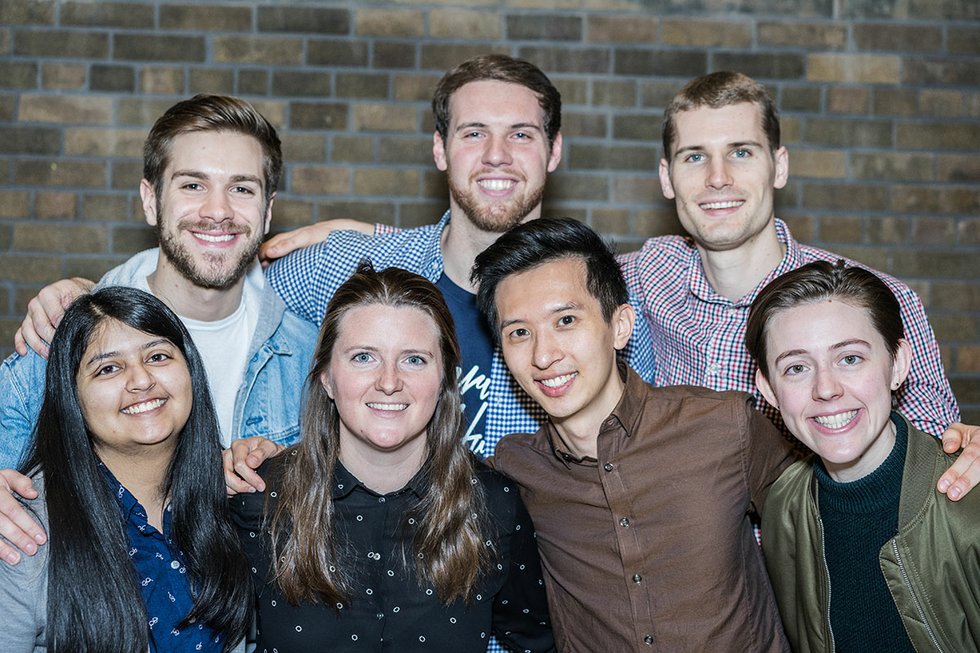
Jeanette Stock has worked in Toronto’s tech industry for about a year. The 25-year-old Queen’s University grad is a customer success manager at Pressly, a content platform startup based in Liberty Village. She also happens to be queer.
Stock and a group of volunteers have organized the city’s first tech and entrepreneurship conference geared towards people who identify as LGBTQ. Venture Out, which is part of Start Proud – an organization that facilitates professional development in the LGBTQ community – takes over the MaRS Discovery District on March 27.
“We realized a lot of LGBTQ students don’t consider startups as a career because they don’t see themselves as ‘tech’ people,” says Stock. “I didn’t even know there was queer female leadership at tech companies in Toronto until I joined.”
She says part of the problem is that there aren’t statistics yet on queer folks working in tech the way there are for those who identify as women or people of colour.
“When I go to tech conferences, I often feel like I’m the only LGBTQ person in the room, and when I go to LGBTQ events, I feel like I may be the only tech person,” Stock says. “I know statistically, that can’t be true, but there isn’t a way for us to see each other.”
Diversity and inclusion in tech has been an ongoing problem. Large companies like Google, Facebook and Apple have struggled for years to increase the number of employees from marginalized groups, especially in technical and leadership roles. In 2014, only 2 per cent of Google employees identified as Black. Latinax representation fared only slightly better at 3 per cent. Meanwhile, women made up less than a third of Silicon Valley’s workforce in general.
Change is easier at smaller companies. In Toronto, TWG has taken measurable steps to improve equity and diversity at the software studio. In 2015, they joined forces with TechGirls Canada to embark on a project dubbed Change Together. It required TWG to examine operational strategies for increasing underrepresented groups in the office as well as addressing intersectional gender diversity within the workplace. In March, they published a report and guidebook for the tech industry.
“I think companies are starting to realize, you can’t just cross your fingers and hope that diversity and inclusion are going to happen,” Stock explains. “Reading the Change Together report and seeing what TWG is doing is really inspiring. If the number of women or queer women joining your team is terrible and the number who are staying is even worse, you have to find a way to create a new process.”
At the start of Change Together, only eight out of 45 employees at TWG identified as women. Now, women total 25 out of 84 workers, including 10 women in technical roles.
“One of the things that came up in the Change Together report was hiring,” says Stock. “They’ve changed the language from, ‘We won’t discriminate,’ to ‘We encourage applications from…’ That’s huge. I think the onus should be on the company.”
Stock also says that tech companies should think about office design and how it may or may not feel accessible to people who are marginalized. For example, employees who identify as trans, non-binary and gender non-conforming may not feel comfortable using gendered washrooms.
LGBTQ employees also might not feel comfortable bringing a partner to work-related events or staff parties.
“Even conversations around what people have done on the weekends should be considered,” Stock adds. “As we create spaces that are more inclusive, it’s important that we remember everyone – trans women, queer women and women of colour.”
Patrick Postrehovsky, the cofounder and CEO of Vancouver’s RentMoola, says prior to launching his startup four years ago, he worked in finance and didn’t feel comfortable revealing his identity as a gay man. Postrehovsky will be speaking at Venture Out on the importance of leadership and authenticity.
“I’ve become less guarded and much more comfortable in my own skin. That wasn’t always the case for me,” he says.
The 35-year-old explains that when he was launching RentMoola, he had several mentors, but none of them were gay. Now, as someone in a leadership position in tech, he makes it a priority to support others who identify as LGBTQ.
“It can feel like a boys’ club,” Postrehovsky says of tech venture capitalists. “So I think it’s important for entrepreneurs who identify as gay or lesbian are role models and connect with people who are walking in their shoes.”
That’s one of the goals of Venture Out, which includes a full day of panel discussions, workshops, a hiring fair and networking events.
“We want to introduce people to the tech industry, but also help build those bridges,” Stock says. “I’m really lucky to have had an overwhelmingly positive experience so far being a queer woman in tech. I think there’s a real hunger in the community to keep getting better at this and to engage.”
For tickets and details, visit Venture Out’s website.
michelled@nowtoronto.com | @michdas












